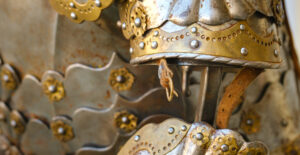
There’s something different about the children of miners. Even if they’ve never set foot underground, they carry the residue of tunnels in their bones. The stories cling to them like dust that won’t wash off, passed down in fragments across kitchen tables, whispered on long bus rides, or wrapped inside newspaper clippings buried at the bottom of drawers. They inherit more than surnames. They inherit echoes.
In towns built around the mines, Rustenburg, Carletonville, Welkom, children grow up under the heavy shadow of gold. Not the gleaming kind behind glass counters, but the hard-won kind. The kind pulled from deep beneath the earth by fathers who left before sunrise and came home too tired to speak. Sometimes they came home coughing. Sometimes they didn’t come home at all.
For these children, “gold” never meant luxury. It meant absence. It meant waiting for a shift to end, for a siren not to go off, for the phone to stay silent. It meant a school uniform paid off slowly, one deduction at a time. It meant knowing that somewhere beneath their feet, a man they loved was clawing through rock for something he’d never wear or own.
The first nugget isn’t a physical object. It’s awareness. It hits early. A realisation that your parent is part of something colossal and invisible, a machinery of wealth that feeds countries while bleeding communities. Some children wear that knowledge with pride. Others resent it. Most just learn to live in its shadow, moulding themselves around it like concrete around rebar.
As they grow older, the inheritance deepens. They learn the language of mining without ever studying geology. Words like “stopes,” “blasting,” and “shafts” enter their vocabulary before “scholarship” or “tuition.” They learn to read their parents’ exhaustion like a second language. They know the difference between a tired sigh and a scared one. Between a normal week and a week when someone didn’t make it back up.
For some, the mine becomes destiny. Sons follow fathers into the dark, not because they want to, but because it’s what’s there. Others rebel. They flee the mining towns, chase different dreams, swear they’ll never let their children breathe that same air. But even when they escape, the gold doesn’t leave them. It’s in the family photographs. It’s in the funeral speeches. It’s in the silence.
 Daughters inherit differently. They inherit the worry. The budgeting. The long waits at clinic queues. The skill of folding pain into packed lunches and school bags. They’re the ones who hear the quiet cries through thin walls, who answer the door to strangers bearing bad news. They inherit the math of grief, how many rands make up a burial. How much overtime might cover the hole left behind.
Daughters inherit differently. They inherit the worry. The budgeting. The long waits at clinic queues. The skill of folding pain into packed lunches and school bags. They’re the ones who hear the quiet cries through thin walls, who answer the door to strangers bearing bad news. They inherit the math of grief, how many rands make up a burial. How much overtime might cover the hole left behind.
Sometimes the memory comes in physical form, an old helmet, a pair of boots, a pay slip yellowing with time. But more often, it’s intangible. A smell. A song. A certain way of standing that echoes someone long gone. Memory becomes muscle, stitched into posture and speech, passed down without permission.
In the rare moments when these families do find nuggets, small windfalls, a pension payout, a claim that goes through, it’s never just money. It’s restitution. It’s something owed. And even then, it doesn’t erase the years. It doesn’t bring back the missing birthdays, the cracked hands, the lungs that gave out too soon.
Still, the children of miners are resilient. They make jokes the rest of us wouldn’t dare. They know how to stretch a meal, how to tell a story, how to sit with uncertainty without flinching. They carry a dignity that comes not from wealth, but from knowing exactly what was sacrificed to keep the lights on.
There are statues of miners in cities across South Africa. But the real monuments are walking around in everyday clothes, grown children who still remember the sound of boots outside the door, who still trace the outline of a name on a locker, who still smell dynamite in their sleep.
The gold leaves the mine. The stories don’t. They settle in the marrow. Inheritances of memory. Invisible, indelible, and impossible to mine out.



